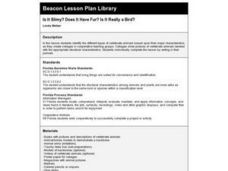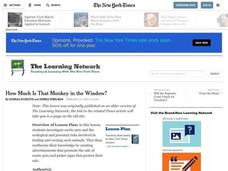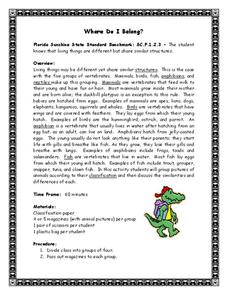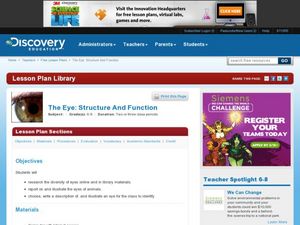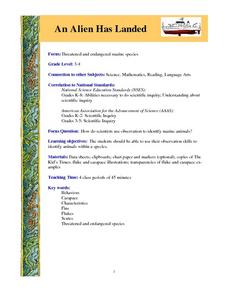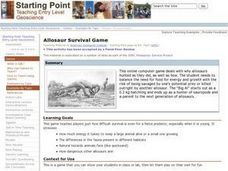Curated OER
Arizona Plant Booklet: An Introduction to Arizona Plants & Cacti
Young scholars explore variety of plants & cacti in their Arizona community by collecting samples and taking photographs. Can be adapted to other areas.
New South Wales Department of Education
Plant Features
Pine needles are actually modified leaves. In the 16th installment of 20, young scientists explore plants. Through an analysis of leaves — shape, veins, and edges — pupils see how to classify plants based on structural features.
Biology Junction
Nonvascular and Simple Vascular Plants: Mosses to Ferns
Sometimes conservationists use specific plants to prevent erosion or fight invasive species. A 50-slide presentation covers both nonvascular and vascular plants. It discusses the plants, their stages and life cycles, reproduction, uses,...
Homeschool Share
Lion Lapbook
Is your class in the mood for a fantastic set of lion-themed activities? Foldables, worksheets, writing prompts, and simple-to-read information are yours for the taking! Intended to accompany a unit on lions, this resource provides...
Curated OER
Is It Slimy? Does It Have Fur? Is It Really a Bird?
Sixth graders identify the different types of vertebrate animals based upon their major characteristics, as they create collages in groups. Collages show pictures of vertebrate animals labeled with the appropriate structural...
Curated OER
How Much is That Monkey in the Window?
Students investigate exotic pets and the ecological and personal risks involved in trading and owning such animals. They synthesize their knowledge by creating advertisements that promote the sale of exotic pets and picket signs that...
Curated OER
Let Me Tell You About My Favorite Animal
Learners create books about their favorite animals using graphic organizers.
Curated OER
Where Do I Belong?
Fourth graders work in groups. They are given magazines. Students cut pictures of five mamals, five birds, five reptiles, five amphibians, and five fish. They place the pictures in a plastic bag. Students switch bags. They are explained...
Curated OER
Animal Alphabet
Second graders identify animals with each letter of the alphabet. In groups, they create a PowerPoint presentation which shows the information they have collected about each one. Using all of this information, they create an animal...
Curated OER
Classifying Objects
Fourth graders classify living things according to similarities and differences through guided and independent activities. They place objects into groups according to their characteristics and then make a collage of living things...
Curated OER
Chicago: The City in Art, 1995-2000
Students examine a mural of animals and talk about animal classification. They act as scientists and keep a record, called a Jungle Journal, of plants and animals they observe while studying the rainforest.
Curated OER
Camouflage
First graders learn how plants and animals adapt to their environments. In this camouflage lesson, 1st graders watch a movie that explains animal camouflage, design a butterfly that blends into a classroom habitat, create a mini book...
Curated OER
The Eye; Structure and Function
Students research the structure and function of the eye. In this anatomy lesson, students write a report about the eye and draw an illustration. They research a particular animal's eye then present their findings to the class without...
Curated OER
Kids for Conservation: Animal Unit
Students discuss animal needs and characteristics. In this animal mini-unit, students complete three activities studying different animals, their needs, how they have evolved, and how to protect them.
Curated OER
Sibling Relationships in the Animal World
Students research sibling relationships in the animal world. In this animal science lesson, students read the book, Sisters and Brothers: Sibling Relationships in the Animal World and discuss the sibling relationships. Students choose an...
Curated OER
Food Webs
Students produce a newspaper covering topics related to food webs. They use print and electronic sources to gather information about specific animals. They share their information with the class.
Curated OER
Arthur's Eyes
Students learn about the parts of the eye. In this eyes and vision lesson, students the story Arthur's Eyes and create a KWL chart about eyes. Students label the parts of the eye, examine the eyes of different animals to compare them...
Curated OER
Arthur's Nose
Students read a story and complete a story map. In this diversity and acceptance lesson plan, students read Arthur's Nose, make a story map, research Aardvarks, complete a Venn Diagram comparing Arthur's nose to other animals in the...
Curated OER
An Alien Has Landed
Students identify animals within a species by using their observation skills to record information, such as behavioral characteristics.
Curated OER
Changing With the Tide
Students research and they role-play the behavior of plants and animals in a salt marsh habitat as the tides change.
Curated OER
Allosaur Survival Game
Learners uses this game to see how difficult survival is even for a fierce predator, especially when it is young. It stresses: How much energy it takes to keep a large animal alive or a small one growing, The differences in the fauna...
Curated OER
Under the Sea
Students identify and interpret that non-fiction books have features like a table of contents, a glossary, and an index, which can efficiently help them find information. They also identify how to narrow the search for information by...
Curated OER
Arthropod Coloring
In this arthropod instructional activity, students compare and contrast the different animals found in the Phylum Arthropoda: insects, arachnids, and crustaceans. Students complete 8 fill in the blank statements and color illustrations.
Curated OER
Animal Slideshow
Second graders view animal fact sheets, and make a slide about an animal. For this animal classification lesson, 2nd graders list facts that help classify the animal. Students use Microsoft paint and color their animal. Students use the...






